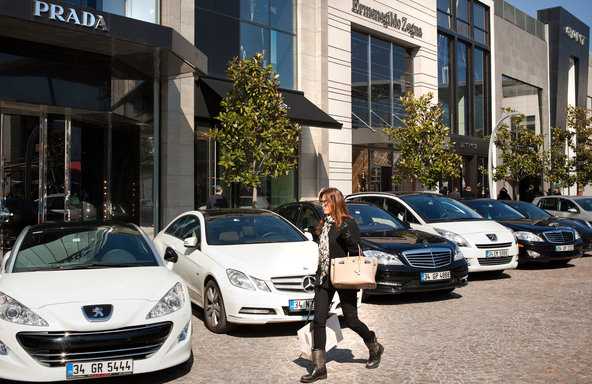
The Istinye Park shopping mall in Istanbul.
With Europe roiled by economic crisis, Turks could be forgiven for engaging in a bit of Ottoman-style chest-thumping.
A sense of material-fueled contentment is evident in Istanbul’s giant gleaming malls where clutches of hip young women in brightly colored headscarves clasp their Gucci purses while shopping with reckless abandon.
Corporate lawyers join six-month waiting lists to pay more than $150,000 for the latest BMW model. There is even a new lifestyle magazine for the burgeoning Islamic bourgeoisie that eschews thrusting cleavage in favor of chic designer veils and five-star resorts with separate his and her’s beaches.
While much of the continent sputtered last year, Turkey’s economy grew by 8.5 percent, according to official data. Even with the fallout from the troubles in the European Union, which accounts for the bulk of Turkey’s exports, the Turkish government forecasts that growth will be 4 percent this year. (The International Monetary Fund predicts a more modest 2.3 percent).
During the decadence of the Ottoman Empire in the 19th century, Turkey acquired the unwelcome nickname “The sick man of Europe.” Now that distinction has been happily passed on to neighboring Greece, where high-spending Turkish tourists have been flocking to islands like Mykonos this summer, perhaps helping to give the battered Greek economy a bump.
Yet for all the signs of evident prosperity — and the loud declarations by Turkish leaders that Turkey is an economic model for the world — economists warn that the Turkish economy is at risk of overheating and then stalling.
Analysts say explosive growth in consumer credit has stoked a worrying expansion in the country’s current account deficit, which is forecast by the government to be 8 percent of gross domestic product this year, an improvement over last year’s 10 percent, but hardly reassuring.
The challenges of plugging financial holes of that magnitude were behind the country’s past two economic ruptures, and some fear that Turkish arrogance threatens to blind Ankara to the perils ahead.
“The economy is slowing down, and if external conditions do not improve the country may not be able to rebound like it did after the 2009 crisis,” said Sinan Ulgen, a visiting scholar at Carnegie Europe. “The government, however, seems to discount this scenario,” he added, noting that overconfidence threatened to blind it to the effects of protracted crisis in Europe on Turkey.
While Turkey’s economic luminaries gloat that Turkey — not Europe or even the United States — will win the 21st century, the I.M.F has in recent months been expressing a far less rosy outlook. That may explain why Deputy Prime Minister Ali Babacan, who is in charge of the economy, recently acknowledged that Ankara had blocked the domestic release of four to five I.M.F. reports, according to the newspaper Milliyet. It said the minister cited “certain subjective analyses” to justify the blackout.
Among its warnings, the I.M.F. has noted that Europe’s spiraling crisis threatens to undermine Turkish exports while the availability of easy credit risks drying up as European banks, which own a sizable chunk of the Turkish banking sector, focus on challenges closer to home. The I.M.F. has forecast 2012 inflation of 10.6 percent and an unemployment rate of 10.3 percent.
On a trip to Turkey in May, the fund’s straight-talking chief Christine Lagarde warned that while Turkey had had a remarkable period of growth over the last ten years, “vulnerabilities are arising as a result of the large current account deficit financed by short-term capital flows.”
The I.M.F. is not alone in advising caution.
In May, Prime Minister Recep Tayyip Erdogan lashed out at the ratings agency Standard & Poor’s after it downgraded Turkey’s credit rating from positive to stable, even as it improved its outlook for crisis-wracked Greece. “This is entirely an ideological approach. You cannot fool anybody, you cannot fool Tayyip Erdogan,” the irate prime minister harrumphed.
Justifying its view, S&P said that less buoyant European demand for Turkish exports combined with the country’s large external debt and a dependence on indirect taxes to plug budget gaps were undermining Turkey’s creditworthiness.
Others point out that regional instability, including the festering conflict in neighboring Syria, could also have a detrimental effect on Turkey.
And while Turkey, buoyed by the Arab Spring, seeks to offset its dependence on Europe by investing in and expanding its presence in the Middle East, economists warn it could take decades before fragile, still underdeveloped economies like Egypt or Iraq yield meaningful economic dividends for Ankara.
Even as the notes of caution intensify, Turks show little sign of reining in their bullishness.
‘‘Those who called us ‘sick’ in the past are now ‘sick’ themselves,’’ Zafer Caglayan, Turkey’s minister of economy, said recently, with more than a hint of well-honed Turkish schadenfreude. ‘‘May God grant them recovery.’’
via Turkey to Europe: Who’s Sick Now? – NYTimes.com.

Leave a Reply